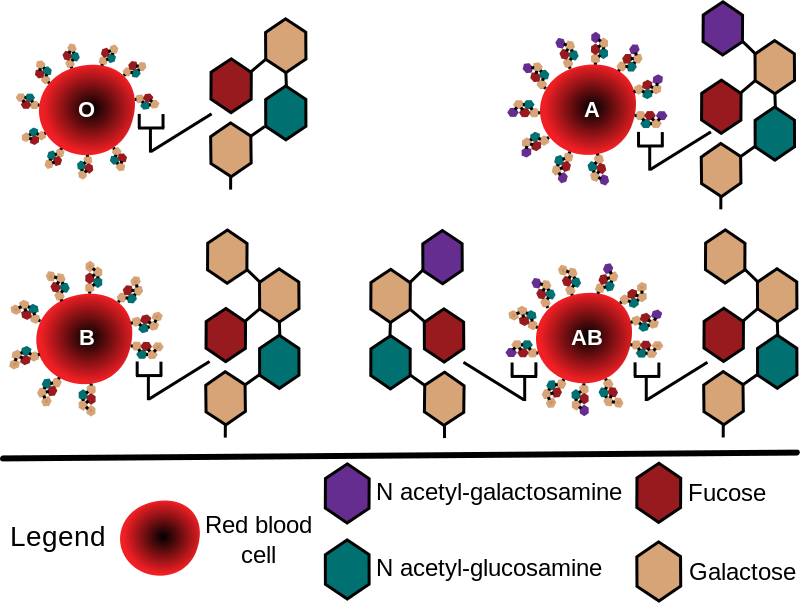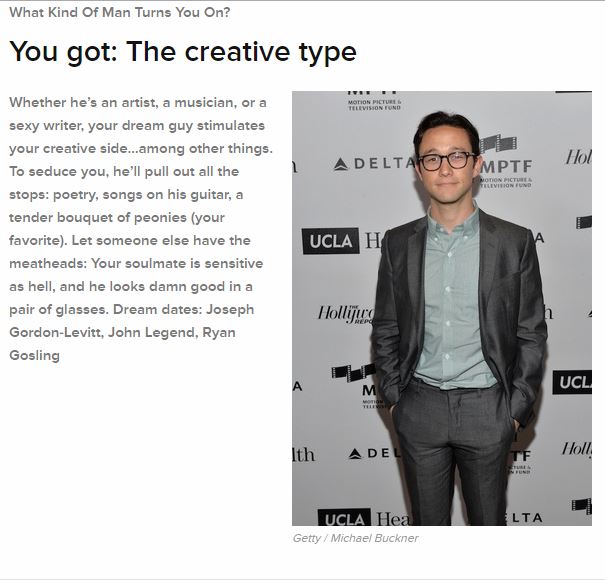I know what you’re thinking. This blog is degenerating. Last week, we talked about semen, and this week, we’re talking about finding the one. Right? “What’s your type?” sounds like the perfect BuzzFeed quiz for your Monday lunch break! But, fortunately for everyone, that quiz already exists, so I’m not going to talk about that type. I’m going to talk about…. blood type!!!
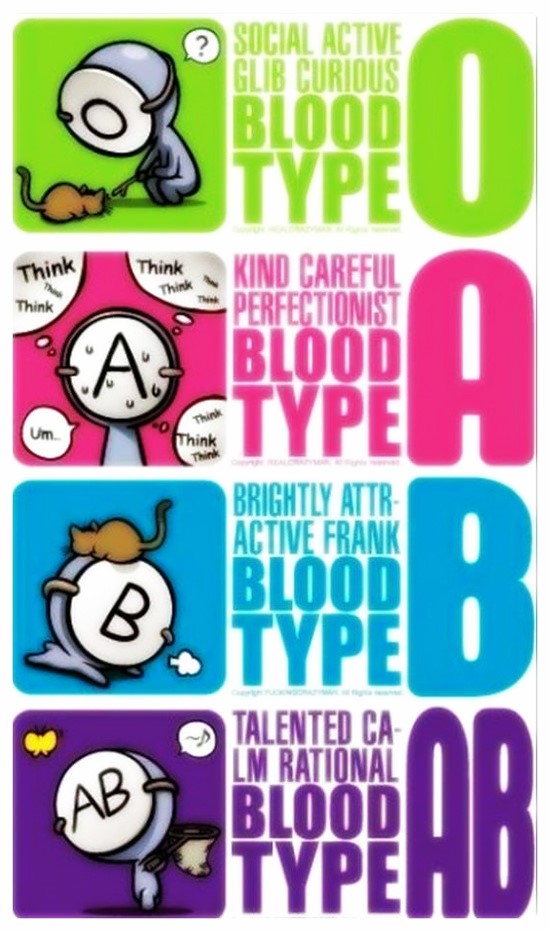
In some cultures (Japanese, for instance), blood type is thought to strongly influence one’s personality. The image above is from a Korean cartoon called “Blood Types Comic” that is amazing. So, actually, your “type” could actually be based on blood type… you vampire!
So what are blood types? Just about all humans have the “H antigen” on our red blood cells*. The H antigen is composed of two galactose rings, one fucose ring, and one N-acetyl-glucosamine ring. People (or rodents or chimps, etc.) with “type A” blood (like me, lol), have an additional N acetyl-galactosamine ring attached to the second galactose ring of the H antigen. Those with blood type B have a third galactose ring attached to the second galactose ring of the H antigen.
Those with blood type AB form both A and B antigens. And those with blood type O (like, obviously, the Queen of O, Oprah) have pure, unadulterated H antigens.
I’m embarrassed to admit that, despite having taken multiple biology and genetics courses in my lifetime (in which we specifically learned about inheritance of blood type), I never realized until now that our blood types are determined by a single gene, our gene-of-the-week: ABO.
(Important: I tried to embed a blood-typing game right here but failed. After you’re done reading this post, you should play: http://www.nobelprize.org/educational/medicine/bloodtypinggame/game/index.html)
ABO encodes a glycosyltransferase: an enzyme that makes glycosidic bonds. And the specific glycosyltransferase encoded determines how the H antigen can be modified. The O allele, as you may have guessed, encodes and inactive glycosyltransferase, so no H antigen modification can be achieved
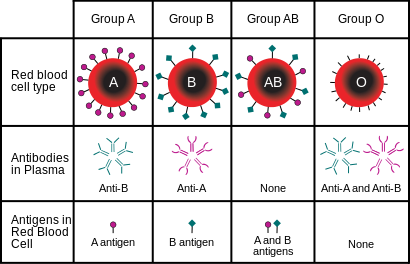
AP Bio would’ve been so much better with Wikipedia…
After birth, we develop antibodies against the antigens we don’t have. Type A plasma develops anti-B antibodies, type B plasma develops anti-A antibodies, and type O plasma develops both anti-A and -B antibodies. These antibodies prevent us from accepting blood from the wrong kind of donors, so it is crucial to know blood types of donors and recipients before a transfusion!
What else is blood type good for?
The A, B, and H antigens are also found on epithelial cells, sensory neurons, vascular endothelium, and other tissues. In particular, ABO also affects two proteins: von Willebrand factor (vWF) and factor VIII (FVIII), which are important for blood coagulation. Specifically, both vWF and FVIII levels increase in the following order: O < A < B < AB (though the link between antigens and these levels are unknown). This raises the question of susceptibility of each blood type to cardiovascular diseases. Indeed, two reviews were recently published that confirmed a close relationship between venous thromboembolism and non-O blood type. Previous reports of non-O blood type risk for arterial thrombosis, atherosclerosis, and postoperative outcomes remain controversial.12
Recently, Hysi et al. (2014) reported that single-nucleotide polymorphisms in the ABO gene coding for the B allele are associated with glaucoma, but the reason for this remains unclear (…get it? :\)3 So, it seems that ABO is important for much more than just our blood type. What a cool field!
*Side note: some people who have a mutation in FUT1 do not have the H antigen! This is called the Bombay phenotype. People with hh will develop anti-A, -B, and -H antibodies so they cannot even receive blood from Oprah! 🙁
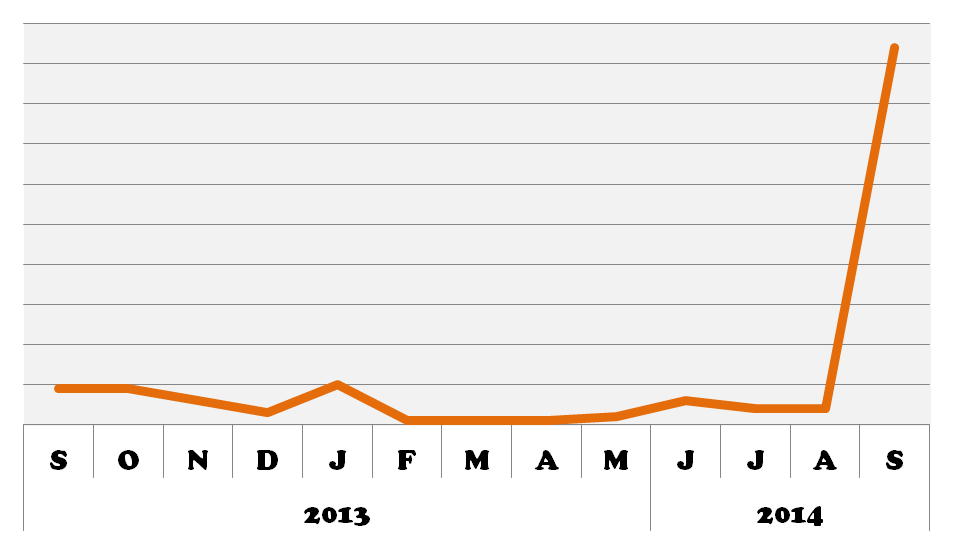
A report on the website The Conversation recently claimed that the AB blood group (only 4% of the population!) is at higher risk for developing cognitive impairment. This may be accounted for, only in part, by differences in FVIII. The statistics discussed in the report are, however, slightly questionable, but unfortunately I don’t have access to the primary article! (Tweet @ me if you do!) Maybe that’s why ABO has been so popular lately.
REFERENCES:
- Franchini, M., and Mannucci, P.M. (2014). ABO blood group and thrombotic vascular disease. Thromb. Haemost. 112, 1–8. [↩]
- Zhou, S., and Welsby, I. (2014). Is ABO blood group truly a risk factor for thrombosis and adverse outcomes? World J. Cardiol. 6, 985–992. [↩]
- Hysi, P.G., Cheng, C.-Y., Springelkamp, H., Macgregor, S., Bailey, J.N.C., Wojciechowski, R., Vitart, V., Nag, A., Hewitt, A.W., Höhn, R., et al. (2014). Genome-wide analysis of multi-ancestry cohorts identifies new loci influencing intraocular pressure and susceptibility to glaucoma. Nat. Genet. 46. [↩]

